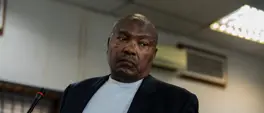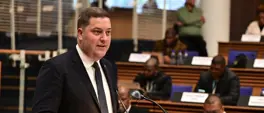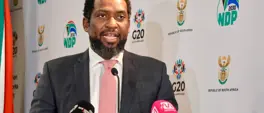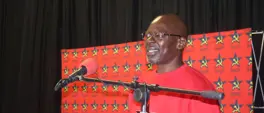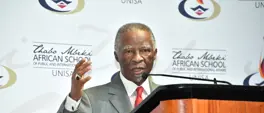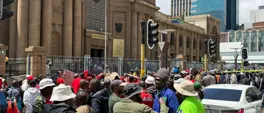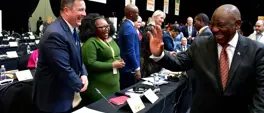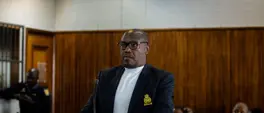SINAWO THAMBO: IFP COGTA minister missing in action as municipalities face collapse
Sinawo Thambo
14 October 2024 | 10:41We do not know what Minister Velenkosi Hlabisa’s plan is to avoid the water crisis confronting South Africans and how he intends to restructure municipal finances to alleviate the high levels of debt, writes Sinawo Thambo.
The DA-ANC Coalition, which has incorrectly been labelled as a Government of National Unity (GNU) has had a terrible 100 days and already has its faces of incompetence, corruption and patronage.
Predictably, the worst of the ‘GNU’s” bad actors come from the two parties, but in our critique of the DA-ANC coalition, we tend to forget the bridesmaids to the coalition, many of whom have been given serious roles of responsibilities.
One of these bridesmaids, in an attempt to broker some level of "GNU" control in the province of KwaZulu-Natal, is the Inkatha Freedom Party (IFP). The IFP, which is one of the political parties that were bankrolled by the influential Oppenheimer family ahead of the 2024 Provincial and National Elections, presides over an extremely strategic ministry through their party leader Velenkosi Hlabisa.
This is the Ministry of Cooperative Governance and Traditional Affairs.
For those who may not know, COGTA, in sum, is tasked with developing mechanisms of good governance, particularly in local government, in order to strengthen the sphere, promote state capacity and put mechanisms in place to avoid disasters. Unfortunately, the minister who is supposed to mitigate against disaster is proving to be a disaster himself, who is not alive to the prevailing realities in local government that pose an existential threat to service delivery.
Local government in South Africa is plagued by a lack of internal management systems and poor capacity, which means every day South Africans are on the verge of a crisis in one way or another. One of the challenges that relate to the incapacity of local government is the reckless expenditure on consultancy fees.
On Wednesday, 9 October 2024, the Auditor-General once again lamented the expenditure by municipalities on consultancy fees, reporting that the 257 local government municipalities collectively spent R1.3 billion on consultancy fees, ostensibly to prepare financial statements. The levels of corruption in South Africa are so high that figures no longer invoke anger because spending R1.3 billion on consultants over a one-year period ought to cause civil unrest.
To make matters worse, the Auditor-General additionally reported that R24 billion worth of irregular expenditure was recorded, and our new minister of COGTA is out there somewhere twiddling his thumbs and has provided no solution or plan to curb this irregular expenditure. There are so many qualified individuals in South Africa who could be contracted by municipalities on fixed contracts to provide the work that this sphere so often sources consultancy services for, but laziness and collusion with consultancy firms for kickbacks means there is no appetite to develop internal capacity in municipalities.
The challenges that require decisive and visionary leadership at COGTA do not end at municipal financial woes, but risk management to mitigate disasters. Many South Africans do not seem to know that on a daily basis, our nation is edging closer to a complete collapse of water provision due to a deterioration of water infrastructure and municipal debt owed to water boards. Put simpler, we will all one day wake up and open our taps and nothing will come out.
Residents of Gauteng are already being prepared for this reality, with Rand Water issuing countless warnings and many on the streets of Africa’s economic hub occasionally roaming amongst us having utilized copious amounts of deodorant and cologne as a substitute for a shower. In addition to this, municipalities across South Africa owe water boards R22.4 billion, while the Vaal and Magalies Water Boards face collapse due to debt owed to them by 19 municipalities.
At the centre of this debt and water crisis is that municipalities do not have effective rate collection mechanisms for bulk users of water such as major corporations and the mining industry. It is the people that will in turn suffer because companies are not servicing their rates. A deeper crisis is that the fiscal framework that governs municipalities is misguided, because municipalities rely on generating revenue by providing services to a poor constituency that cannot afford to pay for them, and the fault for this doomed-to-fail-framework is the National Treasury.
The fact, however, remains, that we do not know what Minister Velenkosi Hlabisa’s plan is to avoid the water crisis confronting South Africans and how he intends to restructure municipal finances to alleviate the high levels of debt. What could Hlabisa possibly be preoccupied with that is more important than a water crisis?
One of the major emerging challenges facing municipalities is their non-compliance with paying over statutory contributions to the pension funds of municipal employees, while they are deducting the money for such purposes for employee salaries. The Financial Sector Conduct Authority (FSCA) has released a report that cites how hundreds of municipalities are defaulting on their pension fund contributions and placing workers' financial security at risk. The Pension Fund Adjudicator has raised the alarm, and the EFF has gone as far as calling for the establishment of an Ad Hoc Committee in Parliament to investigate the matter.
Yet, Minister Hlabisa does not seem to be fazed, even though this crisis worsens by the day, especially with the advent of the two-pot system where workers are able to see in real-time that their money has been stolen.
The political negotiations following the 2024 Provincial and National Elections certainly gave us all a challenge and have produced the worst political concoction our nation has faced yet. The IFP’s minister, in exchange for access to governance in KZN, is an unfortunate product of cheap political bargaining and is occupying a role that is too big for him to fulfil.
Sinawo Thambo is an EFF Member of Parliament and a member of the EFF Central Command Team.
Get the whole picture 💡
Take a look at the topic timeline for all related articles.
Trending News
More in Opinion

31 October 2025 14:15
MALAIKA MAHLATSI: The dangers of the middle-class and the wealthy opting out of government services
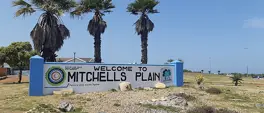
31 October 2025 10:43
ANTHONY HAZELL | Cape Town is actively unstitching apartheid’s spatial legacy
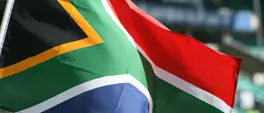
31 October 2025 04:15
MANDY WIENER | Madlanga, exiting grey list shows we are turning the corner

